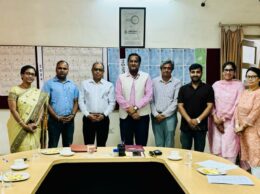Chennai, 16th November 2018: Indian Institute of Technology Madras hosted a National workshop on 3D Printing in Construction today (16th November 2018) in collaboration with the Ministry of Housing and Urban Affairs, Government of India and the Government of Tamil Nadu.
IIT Madras Faculty and Alumni have been involved in research on 3D printing and successfully built India’s first 3D Printed Structure through IIT Madras Printability Laboratory.
Providing a curtain raiser on Global Housing Technology Challenge of the Govt of India, Shri. Durga Shanker Mishra IAS, Secretary, Ministry of Housing and Urban Affairs (MoHUA), Govt of India, said, “We are getting inputs from global players, academic, private sector and other stakeholders in housing for this challenge and are going to announce it soon. This challenge will involve creating ‘living laboratories’ across the country and will be a learning experience for the entire country. Anyone from private, public and academic sectors can learn from these laboratories.”
Congratulating IIT Madras for pioneering initiatives in global construction technologies such as the 3D Printing in Construction, he said that Honorable Prime Minister Shri Narendra Modi had called for getting the best construction technologies in the world to India.
Shri. Durga Shanker Mishra, an IIT Kanpur Alumni, added that Shri Narendra Modi had launched various missions to tackle the housing needs of India. “The objective is by 2022, we must have one house for every citizen where he/she can realize their dreams.”
New technologies are opening up new opportunities. Housing is a problem that requires different and innovative thinking. By 2030, Shri. Durga Shanker Mishra said it is estimated that India is almost going to have 60 crore people living in urban areas. Construction of houses take a long time and are environmentally unsustainable as when construction is done at site, it creates a lot of carbon emission and results in huge water consumption.
Shri. Durga Shanker Mishra added, “We need to use different environmentally friendly technologies. New technologies have to be sensitive to cost, environment, resources and scale.”
The conference aims to present how Construction 3D Printing has the potential to deliver a massive boost to the affordable housing sector of India and to also explore how technology can be incorporated into the area of construction. Developments in specialised concrete mixes, automation and structural design were presented by experts in industry and academia from India and around the world.
Speaking about ‘Pradhan Mantri Awas Yojana’ and the role of new technologies, Shri. Amrit Abhijat, Joint Secretary, MoHUA, said, “This scheme started in June 2015 and its mission and vision is to provide housing to every eligible citizen in the country. We need modern, innovative and green technologies for faster and quality construction of houses. Andhra Pradesh has taken the lead in adopting new housing technologies such as RCC Monolithic Technology. We are looking forward to collaborate with institutes like IIT Madras on new housing technologies.”
Speaking about the Role of technology in infrastructure and housing in Tamil Nadu, Shri. S. Krishnan IAS, Principal Secretary, Housing and Urban Development Department, Govt of TN, said, “IIT Madras has probably the best Civil Engineering Department among technical institutes in India and will play a key role in the Global Housing Technology Challenge. The Government of Tamil Nadu is continuing to foster collaboration with technical institutes in the state to improve governance, service and delivery.”
Several speakers from 3D Printing and policymakers from the Government of India and Government of Tamil Nadu along with experts from the U.S., Switzerland and Singapore besides representatives from the construction industry.
Addressing the workshop, Prof Bhaskar Ramamurthi, Director, IIT Madras, said, “India has a big challenge here. We have to provide housing to all our citizens as soon as possible and new technologies provide an opportunity for this but this is not an easy task. We need technologies better than what we have today. We want to be able to build the houses rapidly because the requirements are huge. IIT Madras is very keen to be part of this community and willing to take a lead role and contribute to helping the country face the housing challenge.”
Providing an overview on 3D Printing and how it can benefit affordable housing and infrastructure, Prof Ravindra Gettu, Dean (Industrial Consultancy and Sponsored Research), IIT Madras, said “The main thing this technology brings is customization. We don’t have to build large housing projects with all houses looking similar. 3D printing provides for diversification, complex shapes and structures. Robotics and automation will play a big role and we can remove the necessity for unskilled labour.”
Tvasta Manufacturing Solutions, an emerging additive manufacturing startup, and the Department of Civil Engineering, IIT Madras, have established a one-of-a-kind 3D printing laboratory – the IIT Madras Printability Lab – to take this indigenously-developed technology to the mass market. Mr. Adithya VS, co-founder of Tvasta Manufacturing Solutions, took part in a panel discussion during the workshop.
Dr. Shailesh K. Agrawal. Executive Director, Building Materials and Technology Promotion Council (BMTPC) Ministry of Housing & Urban Poverty Alleviation Govt of India, spoke about various construction technologies. Prof. Manu Santhanam, Department of Civil Engineering, provided a perspective on the Research done at IIT Madras on 3D printing, Prof. Koshy Varghese, Department of Civil Engineering, IIT Madras, spoke about constructability using 3D printing. Prof. A. Meher Prasad, Department of Civil Engineering, IIT Madras, provided an overview on Glass Fibre Reinforced Gypsum (GFRG) construction.







